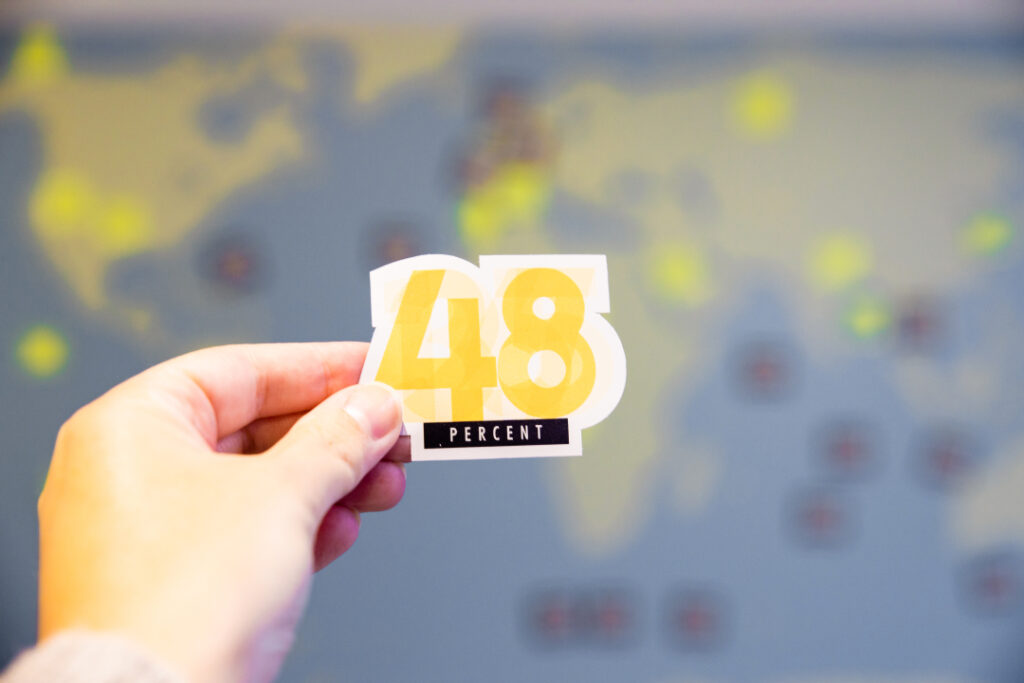Supporting accessibility through APC grants
Through a partnership with APC and Rhizomatica, we are able to support 5 projects actively working to strengthen connectivity in their region.


Update: This blog has been edited to include the links to blog posts about the final results of each project.
We are pleased to announce that through a partnership with APC, 48percent.org is supporting five grassroots organizations around the world in their efforts to strengthen their community networks. These grants will go to help each organization as they work to mitigate the challenges that the COVID-19 pandemic has created for them.
About the supporting organizations
The mission of 48percent.org is to facilitate equality through access to open communication. We believe that the way to do that is by supporting other organizations in their efforts, whether it be through donating our time and resources, or through financial contributions. We were fortunate to come into contact with the APC, who in turn was able to connect us with grassroots organizations to whom we could contribute grants in order to support their continuing efforts.
The Association for Progressive Communications (APC) is an international network of almost 60 civil society organizations founded in 1990. The network is dedicated to empowering and supporting people working for peace, human rights, development and protection of the environment, through the strategic use of information and communication technologies. APC’s mission is to create a just and sustainable world by harnessing the collective power of activists, organizations, excluded groups, communities and social movements, to challenge existing power structures and ensure that the internet is developed and governed as a global public good.
Local Networks (LocNet) is an initiative led by APC in partnership with Rhizomatica to contribute to an enabling ecosystem for the emergence and growth of community networks and other community-based connectivity activities in developing countries. This initiative is part of APC’s strategy to address digital exclusion. APC’s partnership with 48percent.org is exciting as it is building a new ground for collaboration to strengthen the efforts being done to directly support the work of community networks.
How the collaboration came to be
While researching community networks, the name Rhizomatica kept popping up so it was an easy decision to get in touch with them. After a great first talk we learned about APC and its pathfinder grants. As 48percent.org is a young foundation, we don’t have the international reach and infrastructure that APC has, so when Rhizomatica proposed that we could work together and use their already existing infrastructure to issue a COVID-19-related granting call, we immediately jumped at the opportunity.
With the help of Rhizomatica, we created a special grant-call for the organizations that previously received pathfinder grants and asked them what the effects of COVID-19 are on their projects. We got 15 wonderfully inspirational applications from community networks all around the world and after long debate we picked the five projects that spoke to us and our mission as a foundation the most.
Just the beginning
From this partnership with Rhizomatica and APC, we were introduced to five fantastic projects actively working towards what we believe in – equitable access to connectivity. Next to that we have learned a lot about grant programs as well as about community network projects.
To hear more about these projects and how they are progressing, keep an eye on our social media channels for updates about each project. You can find us on twitter and LinkedIn.
About the initiatives
AlterMundi – Argentina
AlterMundi has many years of experience in promoting community networks and all the aspects that make them sustainable like training, maintaining mesh networks, development of free and open software and political-regulatory advocacy.
With the grant, three selected rural communities will be able to start their own network and connect it to the internet, narrowing the digital divide during COVID-19. In addition the funding will also go to the installation of 12 LibreRouter mesh Wi-Fi routers that each will connect at least one family and in most cases more families in the communities.
To read about the outcomes of the work AlterMundi did during this project, click here.
Fantsuam – Nigeria
Fantsuam is an organization whose mission is to empower community members to find means of employment and income and meet their own development needs. ICT services are an important part of their work. People living with disabilities are among the hardest hit by the COVID-19 pandemic. Even under normal circumstances, people with disabilities have less access to education, healthcare and income opportunities, which is only exacerbated by the current situation.
With this grant, Fantsuam will provide 50 people in the Kafanchan area with devices, airtime, digital literacy training and information on how to obtain other funding opportunities provided by the government to cushion the effects of COVID-19 on households and individuals. Many people with disabilities are not aware of these services nor do they have the knowledge of how, or means to access them, especially those living in rural and remote communities.
You can read our blog post about the Fantsuam project to find out the results.
Bosco – Uganda
Bosco is a leading non-profit organization in the area of ICT and community networks in Uganda. Internet access in the most rural parts of Uganda is either non-existent or not affordable. With the lockdown due to the COVID-19 pandemic the government of Uganda proposes to distribute educational information, market information and agronomic information through television and radio, but this is often not suited or accessible only to a few.
With the grant, Bosco wants to establish two new hotspot sites (in addition to the 32 Bosco Uganda ICT centres already established). Through the intranet, they will liaise with the ministry to provide accurate health information and create awareness on the availability of online materials for students. In addition to this the Wi-Fi hotspots will also help in spreading information on the coming elections which will mostly likely be conducted online.
Read our blog post about the project for the full story.
REDES – Mexico
Redes por la Diversidad, Equidad y Sustentabilidad A.C. (REDES A.C) is a civil association that works to create conditions that allow indigenous people to have their own media that meet their principles and values, as well as access to non-indigenous media without discrimination. One of the ways they do this is through the generation of telecommunication projects with indigenous communities.
Because the COVID-19 strategy leans heavily on digital responses, this has made the demand for the internet in rural and indigenous communities indispensable. As commercial models of connectivity are not compatible within the context of many of the indigenous communities, REDES A.C., together with their partners, is seeking to generate a sustainable project that works with an alternative model of connectivity that guarantees the communities access to the internet and the dissemination of information. The grant will go to improving the licensing process for spectrum use, acquisition of new equipment to improve the infrastructure, and training, design and practices of optical fibre installation.
Click here to read about how this project was completed.
Servelots – India
Servelots, together with Janastu, have been engaging with Wi-Fi mesh networking since 2004 after the tsunami havoc on the east coast of South India. Over the last year they have set up a community network in their rural lab area to experiment and deploy new initiatives. After the COVID-19 lockdown and the shutdown of schools, poor agricultural and daily wage earning parents have been struggling to get school sessions over the web to their children. To counter this, Servelots and their collective will introduce “webinar” Raspberry Pi for small low-income neighborhood clusters to facilitate online classroom sessions. The project will take place in a valley where internet speed is low and spotty.
As part of the grant, they will realize a high speed Wi-Fi connection from a nearby town, connect the village clusters to the mesh network and provide open sources and Raspberry Pi-based webinar devices to ensure inter cluster and school teacher sessions. With this project they wish to demonstrate that this could be an inclusive alternative for students who cannot afford individual smartphones.
To find out how this project went, check out this blog post.